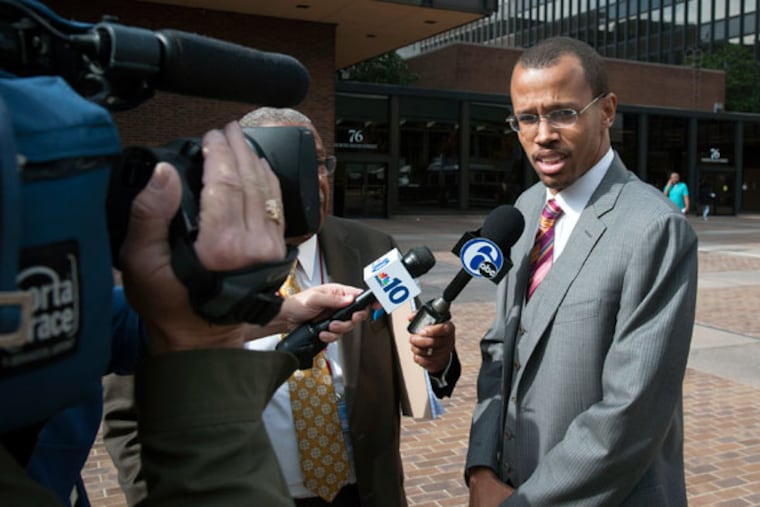Fattah Jr. alleges prosecutor misconduct, seeks probe
Six days after a jury convicted Chaka "Chip" Fattah Jr. on federal bank- and tax-fraud charges, he has asked the U.S. Justice Department to launch a formal investigation into the possibility that prosecutorial misconduct may have tainted his case.

Six days after a jury convicted Chaka "Chip" Fattah Jr. on federal bank- and tax-fraud charges, he has asked the U.S. Justice Department to launch a formal investigation into the possibility that prosecutorial misconduct may have tainted his case.
Fattah, in a letter Wednesday to U.S. Attorney General Loretta Lynch, said his constitutional rights were violated when the lead investigator in the case tipped off an Inquirer reporter in 2012 to FBI raids at Fattah's Ritz-Carlton condo and offices at Logan Square. At trial, FBI Special Agent Richard Haag testified that he had told the reporter, Martha Woodall, about the raid in advance.
The 32-year-old son of U.S. Rep. Chaka Fattah (D., Pa.) was found guilty last week of 22 counts and acquitted on a tax-fraud charge. Assistant U.S. Attorney Eric Gibson said Fattah faces a minimum of just over four years in prison.
His father will have his own trial in May on separate federal corruption charges.
In an interview Wednesday, Fattah said it was essential that he contact top Justice Department officials.
"Based on my interactions with the U.S. Attorney's Office over the last few years," Fattah said, "it is clear that the local office is unwilling to take the necessary steps to deal with the misconduct by the federal prosecutors and FBI agents as it relates to my case."
Fattah, in the letter, said Haag's decision to give a reporter advance notice of the raids cost him earnings of $12,000 per month for 29 months between the time of the leak and his subsequent indictment.
The resulting publicity damaged his reputation even before any federal charges were filed, Fattah said. And his depleted finances, Fattah wrote, "had a direct effect on the counsel I was able to hire in the criminal matter."
Fattah represented himself at trial.
U.S. District Judge Harvey Bartle denied Fattah's request for a mistrial after Haag's revelation. Haag testified that he did not leak any confidential grand jury material.
Last year, Fattah sued the FBI, the IRS, and the Justice Department for damages to his reputation and finances.
His letter Wednesday detailed a Sept. 15 confrontation between Assistant U.S. District Attorney Paul Gray, Fattah's standby counsel, and Fattah that was captured on video inside the federal courthouse lobby.
In it Gray and Fattah's standby counsel, appointed to give him legal advice as necessary, argued over pretrial motions and documents. Gray, according to Fattah, said he would not do anything for "this piece of garbage," referencing Fattah.
In a follow-up conference with the judge, Fattah said Gray called his behavior an "aberration" and apologized.
Gray declined to comment Wednesday.
215-854-2928 @MattGelb